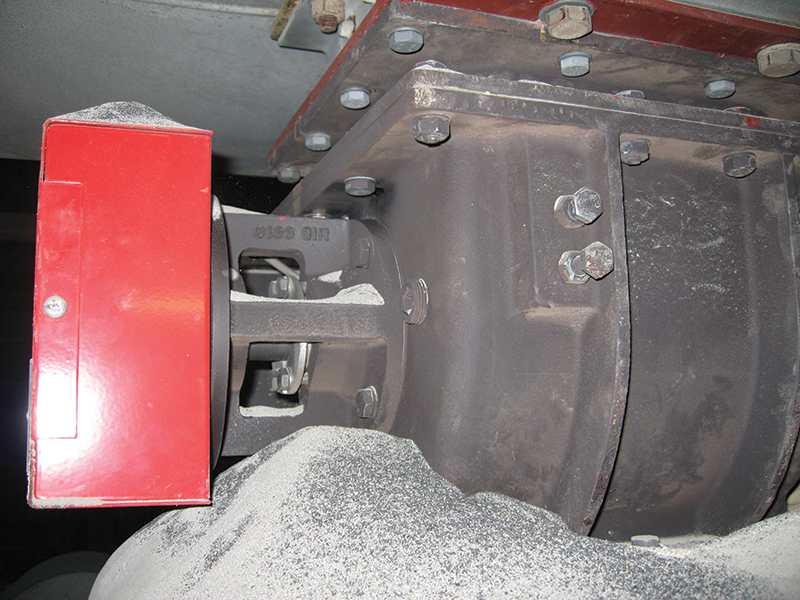A Shaft Seal that Never Leaks

First published in the September 2015 issue of Quarry Management
MID offer a cost-effective solution to the age-old problem of leakage from rotary valve shaft seals
Leakage from rotary valve shaft seals is a problem that has plagued engineers for many years, and even though there are a number of established solutions to this issue, some are more cost-effective than others, particularly when the product being handled is abrasive.
If the rotary valves in your plant look similar to the one shown in the adjacent photograph, there are a number facts that can be drawn about your production process:
- Raw material spend will be higher than it needs to be
- Production capacity will be lower than it could be
- Housekeeping and health and safety standards will be lower than they could be
- Materials that never reach the end of the process as a finished product will be unnecessarily wearing out equipment
- More time will be spent maintaining shafts, leaving less time to improve other processes.
In most industries, maintaining competitiveness is not an option – it is a requirement, and during tough economic times this requirement becomes a necessity for those that want to survive. While everyone seems to be searching for efficiency improvements to maintain profit margins, quite often when plausible opportunities are found, it is a struggle to allocate time and resources to implement solutions. Some repetitive production issues absorb more man hours than others, and dealing with these issues first can free up more time to allocate to other efficiency projects.
Gland packing
Using gland packing to seal a leaking rotary valve is an established temporary solution, but if the product being handled is abrasive, this activity will, without a doubt, drain more engineering resources than any other. Tightening or replacing the packing in the seal will improve things for a short period of time, but this activity will be highly repetitive and largely ineffective in eliminating the issue – it is simply managing the symptoms. In addition, tightening the gland packing may increase the rate of wear on the rotating shaft, and this, in turn, will create unavoidable maintenance for the future. Think about how much more time a maintenance team would be able to invest in improvement projects if they never had to touch another gland seal again.
Air purging
Air purging of shaft seals is another method commonly used to cure rotating shaft leakage. This is where air is purged at a slightly elevated pressure to that of the conveying air and is forced into the shaft seal externally to ‘balance’ the leak. Although this can be a reasonably effective solution in many cases, it can be somewhat ‘hit and miss’ as to whether it will work reliably. By factoring in the cost of generating compressed air, which is typically between £0.01 and £0.04 per cubic metre of air used, and then also factoring in the increase in compressed air usage as wear increases in the seal, this becomes an expensive solution to the problem. Now, instead of just spending unnecessarily on leaked raw materials and maintenance, you are also spending on compressed air.
Mechanical shaft seals
MID have been offering mechanical seals as an option on all of their rotary valves for the last 30 years and say that, as far as they are aware, they offer the most cost-effective and reliable solution to the problem of leaking shafts.
Two Ni-hard rings are ground with a slight chamfer and the edges are then lapped together to form the seal. Fitted to the valve shaft during manufacture, their mating faces are so smooth that they squeeze out all of the air in-between them and ‘stick’ together. Two elastomeric ‘O’ rings are used to provide just the right force on the mating faces to maintain the seal integrity and compensate for wear. By using the most appropriate elastomer, MID’s mechanical seals can be used at temperatures up to 300°C.
For any operator suffering from a leaking rotary valve, MID say using one of their valves with a mechanical seal will instantly provide the following benefits:
- Complete elimination of material leakage from the shaft
- Complete elimination of shaft maintenance activities
- Instant improvement in housekeeping and health and safety standards
- Decrease in raw material usage
- Increase in production capacity.
Costing no more than a few hundred pounds, the payback on MID seals can be as little as a few days, and considering that the valves are ‘engineered to last’, the company says the benefits will run on and on long into the future.
For more information visit: www.mid.uk.com
- Subscribe to Quarry Management, the monthly journal for the mineral products industry, to read articles before they appear on Agg-Net.com
